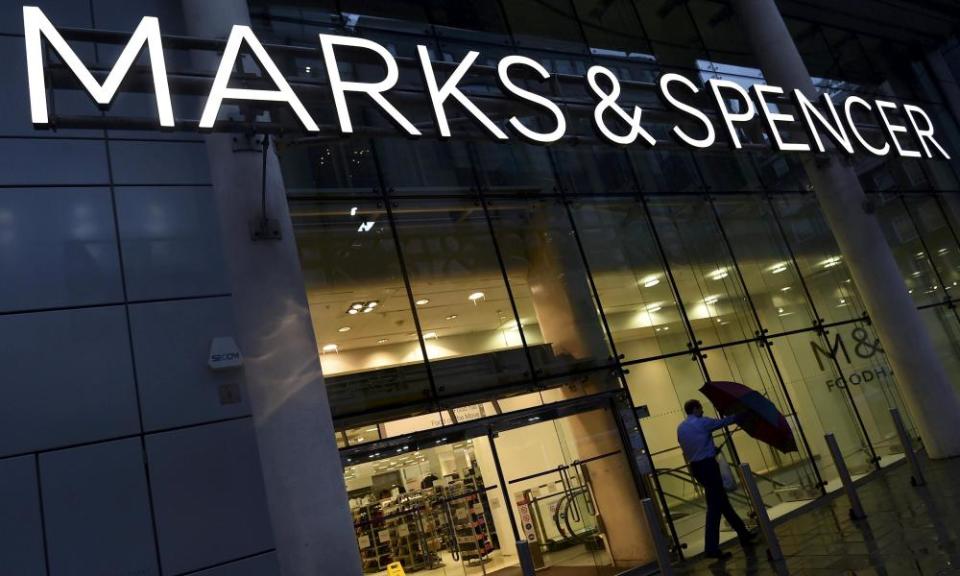Why M&S's website isn't delivering on sales | Nils Pratley

Nobody expected Christmas trading miracles from Marks & Spencer, but surely chief executive Steve Rowe would be able to unveil some juicy figures for the online operation.
Didn’t M&S, under predecessor Marc Bolland, go through agonies to build its expensive distribution centre at Castle Donington – the one with nine miles of hanging garments?
Wasn’t the website revamped to relegate the magazine-style fluff and make it sell more stuff? Aren’t clothing retailers constantly telling us that the “channel shift” to online continues to accelerate?
Yet somehow the sales growth at M&S.com was a miserable 3% in an online market for non-food goods that is generally reckoned to be motoring at about 8%. That 3% should alarm shareholders as much as the 0.4% fall in like-for-like food sales at a time of inflation.
That is because, there’s little mystery about M&S’s online shocker. Despite massive investment in logistics over the years, the system still isn’t up to speed.
When Rowe talks about “restrictions on our ability” at Donington and “managing the proposition quite carefully over the last few weeks”, he means M&S too often missed its next-day delivery targets to customers.
That news will rightly provoke groans from shareholders who had been told years ago that Donington was the answer to their prayers and was merely suffering a few teething problems. The issues are plainly more serious. Without a fast and reliable distribution operation, a retailer is fighting with one arm behind its back in today’s market.
The trading part of Rowe’s strategy is to restore “price integrity” by getting prices lower and by refusing to join the Black Friday silliness. That sounds entirely sensible – about time.
But, again, it’s not a quick fix. The benefits, assuming they arrive, come over the long-term and M&S needs fresh ideas in food to combat supermarkets who have copied its best tricks. Cauliflower steaks – surprise, surprise – weren’t the answer.
In the circumstances, it was a mini-triumph that M&S left its full-year profit guidance unchanged. But, as the 7% damage to the share price indicates, investors have now clicked that Rowe was serious about the timetable when he unveiled his five-year plan last year. Nice Paddington advertisements, but the nuts and bolts of retailing matter more.
Don’t believe the hype at Tesco
Tesco used the word “outperformance” five times in its Christmas statement. “Record” got six mentions and “strong” was shoehorned in eight times. An overdose of hype usually suggests an oversensitive chief executive. If so, David Lewis’s mood will not have been improved by the reaction in the share price – down 4%.
The market isn’t always right, but that snap judgment looks fair. Lewis, the hotshot hire from Unilever in 2014, has engineered a turnaround that is competent and solid but so far unremarkable. From the point of view of investors, the big breakout – the moment when Tesco asserts its market leadership again and leaves rivals in the shade – seems perpetually to lie around the next corner.
Like-for-like UK sales improved by 2.3% in the third quarter but the rate of growth slipped to 1.9% over Christmas period. The figures were good on food – not so hot on non-food – but the City had primed itself for more. This, after all, was Lewis’s fourth Christmas in charge.
On the plus side, Tesco is “firmly on track to deliver our medium-term ambitions”, which is shorthand for saying the goal of restoring profit margins to 3.5%-4% is intact. Fine, but there’s another way to view the medium term at Tesco. The share price is virtually the same as after Lewis’s first Christmas report – a smidgen over 200p.
Save the hyperbole for another day, Dave. In share price terms, Morrisons’ recovery from its own heart attack has been faster and slicker.
South Korea shows states won’t sit on the sidelines over bitcoin
If keeping a check on the value of your investment requires you to monitor hour-by-hour announcements from the South Korean justice ministry, it’s probably time to try something else.
True bitcoin enthusiasts won’t, of course. Instead, it’s possible that South Korea’s clampdown on cryptocurrencies (which turned out to be a proposal to ban trading via exchanges, rather than immediate action) will be interpreted as a reason to buy. The back-to-front logic will be that, if the authorities are getting heavy, then cryptocurrencies must be the real deal.
Thus prepare for more rollercoaster days and nights when the value of bitcoin can fall by $2,000 (£1,500), or about 14%, and then recover.
But, if the South Korean episode shows anything, it’s that governments are not going to stand idly on the sidelines if they suspect cryptocurrencies are being used to dodge taxes.
Boring economists and bankers have made that argument for ages – and they’re right to do so. States like to protect the integrity of their monetary systems. If cryptocurrencies become a problem, governments will act.
The South Korean authorities may be moving prematurely, but their local bitcoin mania is world-beating. Punters have been paying 30% over prices elsewhere.
If economists don’t convince, try Warren Buffett. “I can say almost with certainty that cryptocurrencies will come to a bad end,” he said this week. Remember, he’s the greatest investor the world has seen in the past century.

 Yahoo Finance
Yahoo Finance 